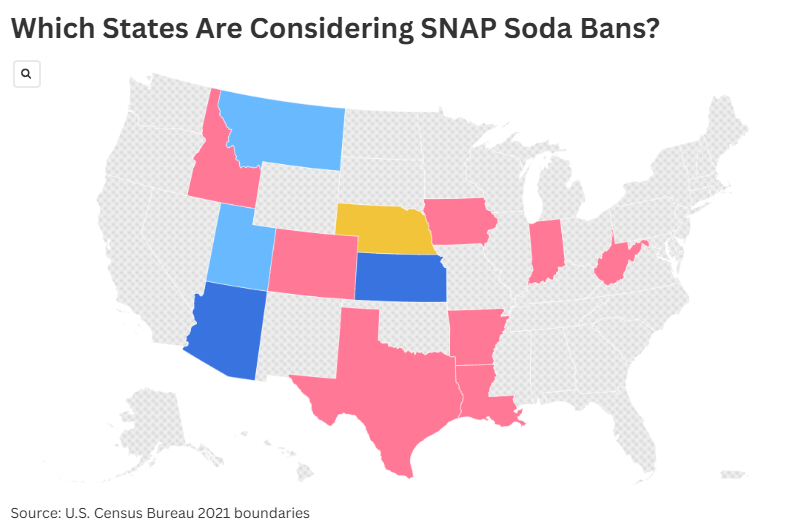
Nebraska became the first state to ban the use of Supplemental Nutrition Assistance Program (SNAP) benefits for purchasing soda and energy drinks, and governors in several other states have submitted waivers to the federal government to implement similar restrictions.
Newsweek reached out to the U.S. Department of Agriculture (USDA) for comment via email on Wednesday.
Why It Matters
The move by Nebraska, approved by the USDA on Tuesday, has sparked discussions nationwide as other states consider similar proposals targeting sugary beverage purchases with federal food aid. Nebraska’s ban could affect more than 150,000 SNAP recipients in the state.
Jacob Wackerhausen/ iStock via Getty Images
Health experts and policymakers have long debated the impact of sugary drinks on public health. Supporters of the Nebraska ban argue that limiting access to these beverages through SNAP could reduce rates of obesity, diabetes and other chronic illnesses. Critics, however, say the bans would not solve issues around food insecurity and may be a veiled attempt at reducing benefits.
What To Know
The USDA’s waiver for Nebraska will go into effect January 1, 2026, and would allow the state to survey participants to measure changes in their spending habits, reported The New York Times. SNAP is federally funded but administered by states.
Several other states have already submitted waivers being considered by the USDA.
Here is the latest in each of these states.
- Arizona Governor Katie Hobbs, a Democrat, vetoed a bill that would have restricted the use of SNAP benefits on soda.
- Arkansas Governor Sarah Huckabee Sanders, a Republican, submitted a SNAP waiver request in April that is still pending.
- Colorado has submitted a SNAP waiver request, the USDA said, per the Associated Press.
- Idaho Governor Brad Little, a Republican, submitted a SNAP waiver request last week, according to the Idaho Department of Health and Welfare.
- Indiana Governor Mike Braun, a Republican, submitted a SNAP waiver request in April that is still pending.
- Iowa Governor Kim Reynolds, a Republican, submitted a SNAP waiver request to the USDA on May 12, reported The Des Moines Register.
- Kansas Governor Laura Kelly, a Democrat, vetoed a bill that would seek a waiver request to restrict SNAP benefits on soda.
- Louisiana Governor Jeff Landry, a Republican, signed an executive order that would request a waiver. It’s unclear if it has been formally submitted.
- Montana’s state Senate passed a bill that would restrict the use of SNAP benefits on soda, and the state House of Representatives will now consider the legislation.
- Texas Governor Greg Abbott, a Republican, requested a waiver from the USDA last week, reported The Texas Tribune.
- Utah’s legislature passed a bill that would require the state to submit a SNAP waiver request, reported Deseret News.
- West Virginia Governor Patrick Morrisey, a Republican, requested a SNAP waiver this week.
What People Are Saying
USDA Secretary Brooke Rollins wrote in a statement: “Today’s waiver to remove soda and energy drinks from SNAP is the first of its kind, and it is a historic step to Make America Healthy Again. Under President [Donald] Trump’s leadership, I have encouraged states to serve as the ‘laboratories of innovation.’ Nebraska Governor Jim Pillen and Governors in Iowa, Arkansas, Indiana, Kansas, West Virginia, and Colorado are pioneers in improving the health of our nation.”
Marion Nestle, nutritionist at New York University, told The New York Times: “Some of this comes from the belief that taxpayers should not be subsidizing unhealthy diets. Some of it reflects condescending attitudes that poor people don’t know what’s good for them. And I’m guessing some of it is a cover for efforts to cut SNAP.”
Dr. Ben Chrisinger, professor of community health at Tufts University, told Newsweek in March that while “most Americans could stand to eat healthier,” he doesn’t see SNAP restrictions as a pathway to achieve that goal.
“SNAP is effectively a subsidy for all kinds of foods, and we have proven methods of incentivizing healthy choices without restriction. Research suggests that healthier foods are often more expensive, and in poorer neighborhoods, harder to find.”
What Happens Next
The USDA could continue approving these waivers over the coming weeks and months. Legislators in other states like Michigan have introduced legislation to restrict SNAP benefits, though it’s unclear whether it will pass or become law.
